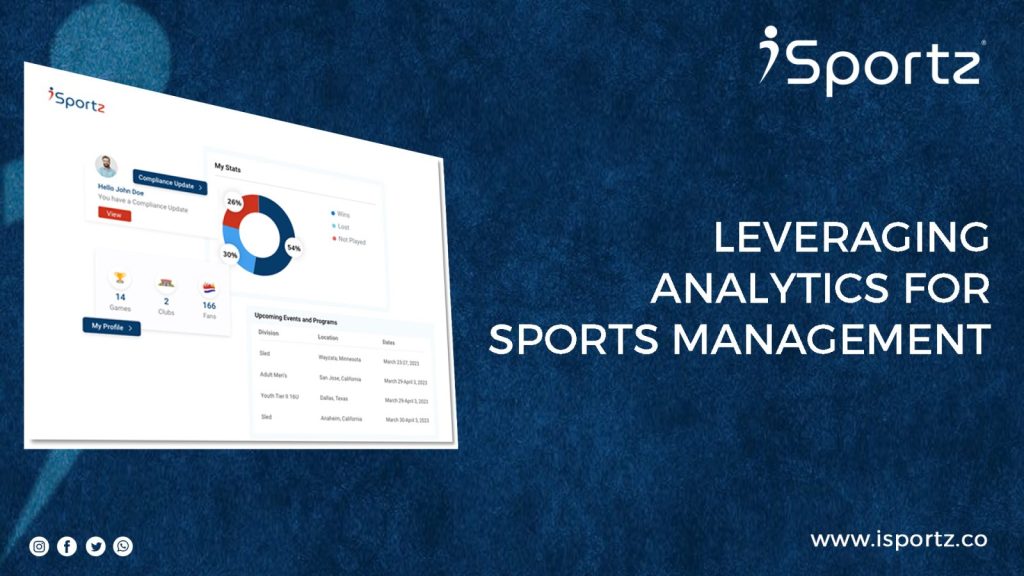Sports was about playing a game for winning or losing until a few decades ago. Analytics has rapidly integrated into the sports industry, making sports more predictable and engaging. The necessity to identify attributes like the athletes’ fitness or performance for a particular season, who is the strongest player, and who is the weakest has prompted data analytics to make a ripple in the sports industry.
What is Sports Analytics?
Sports analytics is a blanket term used for incorporating data and statistics to facilitate game decision-making. The data includes analysis of various components of sports, such as player performance, business operations, and recruitment, which benefits the players and teams playing the sports and the sports organizations managing them.
The Need for Sports Analytics
When focused on gaining competitive edge, an athlete needs to know his/her strengths and weaknesses. Sports analytics allows teams and clubs to become their best version through interpreting and analyzing statistics gained from practice sessions and actual games.
For instance, The American Basketball champions, Golden State Warriors have been using Sports Analytics to improve player performance. Data analysis is credited with strengthening the team’s ball shooting performance. In addition, NBA players use wearable technology to collect data on sleep and fatigue levels for injury prevention during games.
As technology and resources are progressing for data collection, sports analytics is a growing field, and teams are looking for a competitive advantage against their opponents. The game is rooted in tactics, strategy, and details, so studying these aspects is inherent for sports coaching and building teams.
An integrated SaaS platform offers a custom array of solutions and analytics for sports organizations to help them tackle their challenges from the most basic to complex.
Leveraging Sports Analytics Data
Modern-day sports analysis techniques have given us the luxury of detail: the ability to evaluate, measure and analyze the performance in far greater depths. Here are the various areas where sports analytics can be a game-changer for coaches, players, and sports management:
Fitness of athletes: The hyper-quantification of athletes provides efficient training, improves competitiveness, and increases the likelihood that high-performing athletes stay healthy.
Professional athletes like Olympic sprinter Gabby Thomas, Olympic golfer Nelly Korda and PGA golfer Nick Watney use WHOOP’s wearable device to track physical metrics like active/inactive heart rate, sleep cycle, and respiratory rate. The device aims to help athletes better understand when to push their training and when to rest.
Game-day strategy: With data visualization, apart from game data of the previous events, match day data is also provided when the ball is actually on the pitch. This helps coaches to decide on different scenarios.
Soccer: Should our goalkeeper pass out of the back against our next opponent? Or continue to play longer?
Hockey: When is the minimal optimal time to pull our goalie?
Football: In what situations should we go for it on 4th down?
Cricket: Should we send a spin bowler for a left-hand batsman in the last over?
For instance, SportVU has six cameras in each NBA arena which gather data on the movements of each player movements of the basketball twenty-five times per second.
Player Evaluation: Data on the player evaluation provides clues to coaches on which player is likely to perform well and which one is likely to slump. Based on this data, coaches can adjust game-day lineups. Popularized through the movie and book Moneyball (2011) that documented Oakland Athletics, NFL coaches are now using analytics to assess player talent and situational performance.
Ticketing: Data Analytics brings in the stadium crowd and improves fan engagement. Analyzing past performance to determine optimal pricing strategies and setting ticket prices on demand. The staffing managers at the American professional baseball team, Texas Rangers, use real-time ticket data monitoring to close 75% of ticket sales on a bad-weather day.
Scouting: Sports analytics uses sports-related data and information from expert scouts to build predictive models around this data. The scouts can compare current and previous players’ power and speed with data models. Most American football performance companies use data extraction technologies to help football clubs identify the best-performing players. Using performance information, a coach can validate if a process to increase player potential is effective or not.
The bottom line
From predicting the game score to going for it on the fourth down, Sports data Analytics is a game-enhancing ingredient. As sports management focuses on gaining a competitive edge over the others, they can leverage an integrated SaaS platform to gain actionable insights to drive positive outcomes.




